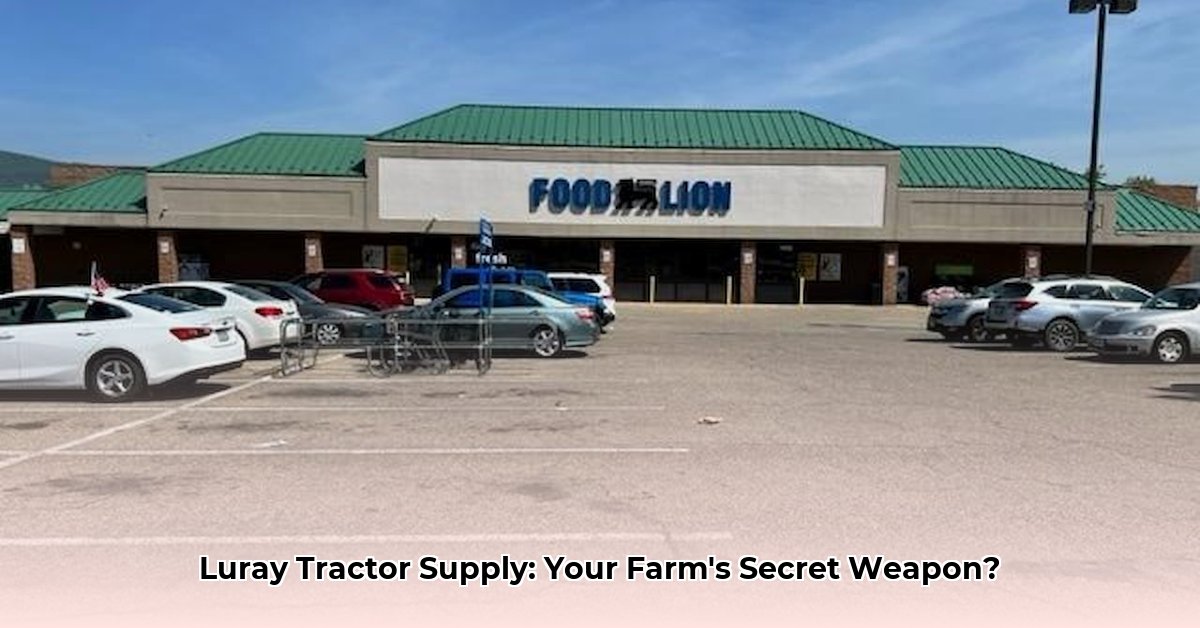
Understanding Luray Tractor Supply's Impact on Sustainable Agriculture
Luray Tractor Supply (LTS) serves as a vital resource for farmers in and around Luray, Virginia, providing convenient access to essential agricultural supplies. For more information on Luray Tractor Supply, visit their website: LTS Website. However, its influence on sustainable agricultural practices within the community remains largely unexplored. This article analyzes LTS's potential impact, identifies key challenges, and offers actionable recommendations for farmers, LTS, and local governing bodies. We will focus on improving sustainable farming practices utilizing local supply chains, emphasizing the importance of accessibility, transparency, and community collaboration.
LTS's Accessibility and Geographic Reach
LTS's central location offers convenient access for many local farmers. However, the distance to the store significantly impacts farmers in more remote areas like Rileyville and Egypt Bend Estates. Increased travel time, fuel costs, and potential weather delays could hinder their ability to fully utilize LTS's resources. A detailed analysis of travel times from various farms to LTS, accounting for diverse transportation methods and road conditions, is needed to accurately assess its genuine geographic reach and equitable accessibility. This data would inform future strategies to improve access for all farmers.
Sustainability within LTS's Supply Chain: A Missing Piece
A critical knowledge gap exists regarding LTS's sourcing practices and their contribution to sustainable agriculture. Currently, there is limited information available about whether LTS prioritizes suppliers who employ environmentally friendly farming methods or partners with local businesses committed to sustainability. This lack of transparency hinders a complete evaluation of its overall impact. Comprehensive research, including direct surveys of LTS suppliers and detailed analysis of product labels and promotional materials, is crucial to address this issue. Such analysis would reveal the extent to which LTS's supply chain supports sustainable agriculture and provides valuable insights into areas of improvement.
Empowering Farmers: Actionable Steps for Sustainable Practices
Farmers can directly influence sustainable practices by adopting these measures:
- Product Scrutiny: Carefully examine product labels for certifications indicating sustainable practices (e.g., organic, fair trade). Prioritize products with eco-friendly packaging.
- Diversified Sourcing: Explore alternative suppliers that are known for their sustainable methods. Network with other farmers to discover local producers or cooperatives. Consider direct sourcing from farms practicing sustainable agriculture.
- Constructive Feedback: Communicate your needs and preferences to LTS. Actively express your support for sustainable products and practices. Encourage LTS to improve its environmental impact.
Collaborative Change: A Multi-Stakeholder Approach
Achieving sustainable agriculture requires a concerted effort from all stakeholders:
Luray Tractor Supply's Role: Regular sustainability assessments, including evaluations of sourcing, product management, and waste disposal, are essential. Publicly reporting these findings builds trust and transparency.
Governmental Support: Local and state governments can provide crucial incentives for sustainable farming practices, such as grants, tax breaks, or subsidies for farmers adopting eco-friendly methods.
Consumer Engagement: Consumers must actively seek transparency in food production and prioritize products from companies committed to sustainability. Making informed purchasing decisions directly influences market demand for sustainable products.
Research Needs and Future Directions
Addressing the existing knowledge gaps requires further research focusing on:
- Supply Chain Transparency: Tracking products from origin to shelf to identify and mitigate environmental impact at each stage.
- Farmer Practices: Surveys to gauge farmers' reliance on LTS and the influence of purchasing choices on sustainable practices.
- LTS’s Operational Efficiency: Analyzing LTS's waste management, energy consumption, and transportation methods to identify opportunities for improvement.
This comprehensive approach will illuminate LTS's true role in fostering a sustainable agricultural future.
Actionable Steps for All Stakeholders
| Stakeholder | Immediate Actions | Long-Term Goals |
|---|---|---|
| Local Farmers | Evaluate LTS products for sustainability; research alternative, local suppliers | Adopt sustainable farming practices; actively support local sustainable providers |
| Luray Tractor Supply | Implement a sustainability audit; enhance transparency in sourcing and operations | Develop a comprehensive sustainability plan; publicly report progress annually |
| Local & Regional Gov't | Analyze regional sustainability needs; create financial incentives for farmers | Invest in infrastructure and training to support sustainable farming practices |
| Consumers | Demand transparency; actively seek out sustainable certifications on products | Prioritize purchasing sustainable, locally sourced products; support local businesses |
Luray Tractor Supply's contribution to sustainable agriculture depends on enhanced transparency and cooperative efforts. While convenient access to supplies is crucial, a collaborative approach is needed to create a truly sustainable farming system. Continued research is paramount to developing effective strategies for a more environmentally conscious and economically resilient agricultural future. The role of local supply chains in this process cannot be overstated.